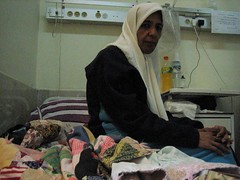Since I arrived a month ago, the majority of my time at work has been dedicated to the annual report, a magazine-like coverage of all that goes on under the auspices of the LWF’s Jerusalem branch. The publication should be, as Mark likes to put it, “upbeat,” but still express the current situation. The articles filling these 36 pages are coming from four different sources, and as they’ve accumulated, common themes have emerged and none of them are upbeat or even close. In nearly every article on every project is a mention of The Wall, a two-year-old ongoing construction that casts a long and dark shadow over the people of the West Bank. This wall that Israel is building in a twisting path through Palestinian land is sealing people into their towns and restricting travel on roads. It blocks Palestinians’ access to the hospitals, the schools, the jobs and the families they had once been able to reach easily. Every Palestinian living in the West Bank or Jerusalem is affected by the Separation Wall, and every program we run has to stretch to provide not only health care or education, but also travel permits for people to travel within their own land.
The hospital we run here, Augusta Victoria Hospital, recently opened the only radiation oncology department in Palestine, meaning that if a West Bank Palestinian develops cancer, he or she has one option for radiation treatment: traveling to Jerusalem. And that’s if they’re able to make it through the restrictive and time-consuming permit application process. I was at the cancer center yesterday, taking photos for the annual report and learning the inner workings of a linear accelerator machine. I was introduced to Buthaina when she was sitting on the edge of her bed, a rattling cough shaking her body as she spit pellets of phlegm into tissues, an effect of what is likely laryngeal cancer but has yet to be diagnosed. She speaks lovely English and let me photograph her while her mother-in-law sat nearby and smiled at us. Buthaina is from Nablus, a West Bank city about 35 miles north of Jerusalem, and she worked as a nurse there until she became sick. While the drive between the hospital and her home doesn’t take long, the time involving the checking of her permit and the stops at checkpoints makes a daily commute out of the question. Thus, she’ll be an in-patient at the hospital until her radiation treatment is completed. Her mother-in-law was able to acquire a permit as well, but the rest of her family—her husband, her children, her own mother—have not been granted permits and are unable to visit her.
Since the start of the Wall, the hospital has taken on the task of working with the Israeli government to get the necessary permits for patients who need to reach the hospital for radiation treatment or ear surgery or kidney dialysis. A busing system was set up to help staff and patients in nearby towns reach the hospital without having to spend three hours waiting at a checkpoint for a fifteen-mile journey. It’s astounding to see all the effort that goes into simply getting a person to a hospital for very necessary health care, but still, upbeat is hard to achieve during an unjust time in an unjust situation.
a miniturized version of life in the holy land

